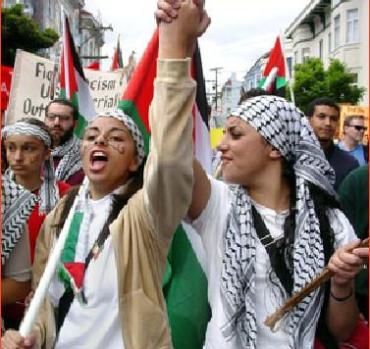These are not Pakistani girls. I chose them to illustrate this post about a Pakistani girl because they are Muslims.
Malala Yousafzai has earned far more than the West’s adoration. She has earned its serious attention. Specifically, she has earned for her culture and religion more than a self-serving Western focus on the girls of our enemies, one that removes Malala from her culture by making her its miraculous, inexplicable counterpoint, rather than its legitimate representative.
Malala isn’t the first hero whose achievement is diminished by this extreme exceptionalism. While the transcendent scope of her sheer courage may justifiably remain beyond our full grasp, the source of her self-esteem should not. The sub-text informing our dazzled praise eliminates any need Malala might ever have for damnation:
“Where did this girl COME from?
Where did a FATHER like hers COME from?”
We are stupefied when the answer begin and ends in Islamic Pakistan, and nowhere else. Evidently, here is a culture with all the ingredients necessary to produce a girl whose sense of self-worth makes Western claims of gender equity look like a puppet show. High in the ancient Swat Valley, in Pakistan’s Northwestern Province, where the first Buddhist Kingdoms are believed to have developed over 2,000 years ago: this is where we find Malala.
We find her in her culture, in her town, and with her family, specifically her father – who, rather than seen as a heretic by his fellow citizens, is regarded throughout the region as a hero.
“This is no elitist Karachi family with cousins in London,” journalist and filmmaker Adam Ellick, who documented the Taliban takeover of the Swat Valley told Time Magazine in October. “They are lower-middle-class peasants. They are villagers. Their relatives all live within a short walk.”
Amnesty International Pakistan researcher Mustafa Qadri stressed the point, “Ziauddin Yousafzai is a deeply religious man, in the best sense of the term. I remember him constantly talking about his Islam and that it tells him to get his daughter educated and to make sure that women get the same rights as men. Her father is very brave, very eloquent, as is Malala.”
Ellick confirmed ,” This is a story about a father and a daughter, more than a story about a girl…I can’t imagine being his child and not fully taking on everything he says…not having what he believes in become what I am going to believe in.”
But we are unable to see Malala in this context, because it makes the fact of her impossible for us. And so we make Malala her own context, an oppositional and miraculous representation of the West who has flowered via some kind of transcontinental osmosis, right under the noses of the Taliban – by which we mean Muslims.
In doing so, we become her enemies, not her champions. With the West’s irrepressible combination of ignorance, confidence, and aggression. we reduce Malala’s Islam, her ancient land, and its complex history to a larger than life individual who serves us as an agent of her own destruction.
She has repeatedly presented herself as representative, but we have made it impossible for her to be anything but an exception. The unfortunate result has been a diminishing of the girls for whom we had thought to claim center stage. That’s not a message they should get.
What if she’s right? Let us meet the girls with whom Malala clustered and talked, rode the bus and played, all the while mastering the great girl art of pouring out their hearts. Let us pay attention to the spiritual beliefs that sustain them.
Maybe we will discover a tradition of egalitarianism – an Eastern, Islamic thread, not a message dropped from a plane by Christian missionaries. Maybe this tradition reflects an ancient belief in the equality of all souls, even, as in the West, gender roles informed the political life of the broader culture. Maybe we will learn more than we want to know about the history of Islam and girls.
Maybe we will finally realize that the Taliban are the modern ones. They prove that cultures can indeed be driven mad by the trauma of constant rupture. When you are poor and the universe has been tipped on its head, you are vulnerable to reducing tradition to simplistic levels. That’s how you control the terms of resistance. I can guarantee – and I mean guarantee – that were it not for colonialism’s evil ravages, and the subsequent cultural, social, and economic degradation and inequity that has been visited upon the East ever since, the Taliban would never have evolved.
The East will deal with the Taliban. Islam will deal with the Taliban. What assistance we owe should be determined entirely by those who struggle daily in the villages of the East.
But U.S. imperialism? It will only feed the Taliban. Our endless occupation of their very lives and our evil drones will send enraged boys rushing to join its ranks, providing us with the excuse we need to reduce them to rubble.
The highest honor we can pay Malala is to respect her religion, her culture, and her history, and to demand the freedom of her people from the unbearable yoke of American oppression.
Black Panther Party Rally, U.S.A, 1970


![black_panther_ladies[1]](https://electricinthedesert.wordpress.com/wp-content/uploads/2013/10/black_panther_ladies1.jpg?w=300&h=232)
Claire, this is grippingly eloquent and chock full of insight. I admired Malala very much and her father, but never saw the manipulation of the story for what it is, or associated the area of conflict with the flowering of Buddhism. Thank you for reblogging it. So glad I didn’t miss it.
LikeLiked by 1 person
Reblogged this on Eléctrica in the Desert.
LikeLike
Thank you so much for reading my blog, firstly! I find this article very thought-provoking. It’s amazing (and very disturbing) how the image of a person can be manipulated to fit into the “mainstream.” But it is not only the U.S. that does it.
LikeLike
Of course you are right. It’s just that the U.S. has so much more power than any other nation.
Thank-YOU for reading my blog. Right now, so much of what I post is (are?) re-blogs; thus, I’m particularly grateful for any positive reaction.
Your own blog reflects an imposing intellect – it really does; people should check it out – so I’m actually feeling sort of honored here.
Ahem.
Anyway – thanks again! I’ll be over to visit soon.
LikeLike
Claire, your sensitivity to this topic is brilliant and beautiful! I remember watching Diane Sawyer’s interview with Malala. It was excruciating the way Sawyer connecting lines between Malala and American pop culture, even going so far as to mention Bieber, drawing images in viewers’ minds that this brave and strong Muslim girl manifested the traits not associated with anything other than true American ideals. What else can one expect from mainstream? Thank you for this exceptionally insightful piece.
LikeLike
Thank-you very much, Shainbird! I got so I was yelling at the television so much that I had to switch the channel every time Malala came on. And print media was just about as bad. Thank-you for being one of the people who lets me know I’m not seeing the world alone. And thanks for your own great blog!
LikeLike
Yelling at the TV. Yep. Watch as little as I can for that very reason.
LikeLiked by 1 person
I have chills reading this. A very impressive article, I can’t wait to read more of these, I’ll definitely be back.
LikeLike
Thanks very much! My blog has plenty of unimpressive moments as well, believe me…(-:
Feeling lucky to have met your poems and plan to visit them again very soon.
LikeLike
This is a great article.
It’s true that Malala has been conveniently depicted in the Western media as a 1 in 180’000’000 exception to the rest of Pakistan. But as you point out, the truth is much less contrived than the sanitised version produced for Western audiences.
Malala is a product of her home nation – Pakistan. Much like the other girls who were riding on that school bus with her, two of whom were also shot. Cynical attempts to remove her from that context only serve to reinforce Eurocentric stereotypes.
LikeLike
Thank-you, Akwesi. Your opinion is an important one. I’m sorry I took so long to post this and other replies. Readers will be interested in your own post on the topic, published in London, which I understand got 30,000 hits. Will you please post a link to it here, as I am having dreadful problems checking on any info and even staying online without getting off every time I try to do anything. THANKS!
LikeLike
Very nice essay! I completely agree with most of what you said, and all the comments sum up all the gist of this. I think that Malala’s the example that other countries can take care of themselves if all the foreign interventionism stopped. All the countries are filled with wonderful men and women with enough moral and virtue to fight for a better life for everybody, but they can’t show their potential if these drones and foreigners keep messing with their lifes.
Or so I think ><;
LikeLike
You said it! Coming from a Mexican student, your reply is particularly powerful – the U.S. messes with few countries as much as it does yours. I salute you, hermana!
LikeLike
A truly superb essay. People everywhere must deal with their own cultural and societal failings. Outside interests should stay out. American interventionism is duplicitous, however. In actuality, it is far less concerned about human rights than it is about maintaining the hegemony of global capitalism. If America’s socioeconomic establishment was as altruistic as it likes to portray itself, then it would concentrate first on addressing the grave problems of inequality, poverty, corruption, and disunity, within the U.S.
LikeLike
Thank-you, Robert. Your opinion means something.
What astonishes me is how obtuse Americans remain on this topic, while THE WHOLE WORLD knows better. It might not express this awareness to the U.S, but that’s just indicative of the dynamics of power.
Hey – thanks again.
LikeLike
Propaganda and indoctrination are powerful tools. Americans have been afflicted perhaps more so than any other society because the coercion has taken place subtly and over an extended period of time. What did Pope Francis write about last week… the “idolatry of money?”
LikeLike